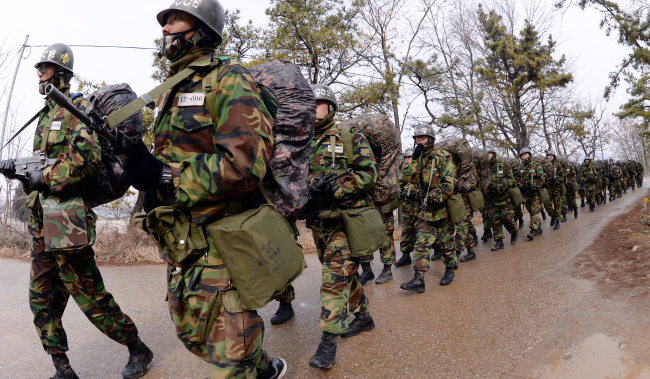For Kim Tae-jin, an employee of a conglomerate in Seoul, his division’s leader is no different from a military company commander. Kim always toes the line without talking back, knowing that his boss would not listen to lower-level staff.
“I always just listen to whatever he says, opting to refrain from making any proposals or expressing my own opinions. After all, my boss will do everything as he wishes anyway,” said Kim.
“On top of that, even when I have my personal plans to spend time with friends or family members, I wouldn’t dare turn down my boss’ sudden calls to attend company dinners where we, most of the time, end up drinking a lot.”
Like Kim’s case, military mores have seeped into many parts of Korean society ranging from the corporate sector to academia, and even in athletic fields, as men, who completed their mandatory military service, climb up the social ladder.
 |
|
Army recruits in full gear march as part of their five-week basic training at a boot camp in Nonsan, South Chungcheong Province. (Ahn Hoon/The Korea Herald) |
As the country now promotes individuality and creativity, the rigid culture has started to wane. But in male-dominant sectors, a military-style leadership still lives on.
“Well, we don’t have insignias on our clothes, but it is virtually a military environment here at our technical research center,” said Ahn Ho-young, an engineering student in a doctorate course of a university in Seoul.
“With my professor calling all the shots with regard to my thesis and other academic affairs, we just do what we are told to do in this hierarchical structure. I think that to carry out piles of work in an efficient way, a military culture has naturally taken firm root here.”
In the 1970s and ’80s when citizens’ levels of education were low, the military was one of the rare organizations that produced well-disciplined, systematically trained human resources.
Thus, companies, schools and many other sectors sought to recruit retired soldiers to emulate what was then regarded as an “advanced” culture. Some companies have given former military officers extra points on their recruitment exams.
Former military officers were useful in training entry-level employees, forging a stable management structure and pushing for major corporate projects more efficiently, albeit in an undemocratic, authoritative manner.
However, there have been efforts to change the military culture, with many employers encouraging their personnel to offer creative ideas that would help them better compete in the local and global markets.
“That military culture is now a relic of the past, at least in our company,” said an official of another major conglomerate, declining to be named.
“We seek to inject fresh blood into our organization based on our conviction that their fresh perspectives and insights would help us respond more proactively to the fast-changing market trends and find what senior staff might have overlooked.”
By Song Sang-ho (
sshluck@heraldcorp.com)